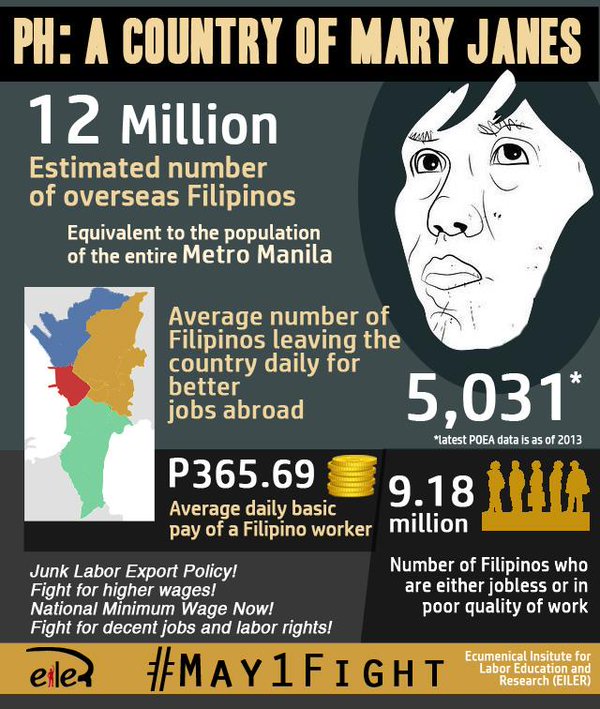The Philippines is home to millions of Mary Janes.
This was how labor NGO Ecumenical Institute for Labor Education and Research, Inc. (EILER) described the magnitude of forced migration in the country, referring to the plight of migrant worker Mary Jane Veloso who got a temporary reprieve from death row in Indonesia.
EILER said there are currently around 12 million Filipinos working abroad, which represents one-fifth of the entire Philippine population. Daily, around 5,031 Filipinos leave the country based on the latest official data as of 2013.
“The Philippines is currently a nation of millions of Mary Janes as more and more Filipinos seek better opportunities abroad due to very low wages and poor employment prospects in the country,” EILER executive director Anna Leah Escresa said.
“Filipino workers would not need to seek opportunities abroad like Mary Jane if the local economy can provide sufficient decent jobs with decent pay,” Escresa added.
She said the average daily basic pay in the country of all workers stands at only P365.03, which means that majority of Filipino workers are paid below the average minimum wage.
“Factoring inflation, the average wage of P365.03 will only translate to a real wage worth P264.51. Under the Aquino administration, the real value of wages is almost flat without any significant increase,” Escresa said.
EILER also noted that joblessness has worsened, with 152,000 Filipinos added to the ranks of the unemployed in January 2015 from October 2014. The Philippines has also one of the highest unemployment rates in Asia with 6.6 percent.
“Quality of work is also deteriorating, as new jobs created over the past two years mostly fall under the categories of part-time work and self-employed,” Escresa noted.
The labor research group is calling for the creation of decent jobs at home through the development of national industries and genuine agrarian reform.
It joins the clamor for better working conditions in social media through the hashtag #May1Fight.



Be the first to comment on "‘PH a country of Mary Janes amid stagnant wages, joblessness’"